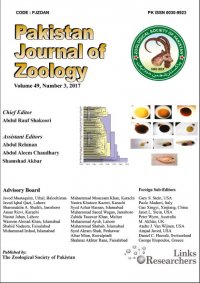Breast Cancer Prognostic Indicators and Vitamin D Receptor Gene Polymorphism (FokI and TaqI) in Pakistani Women
Breast Cancer Prognostic Indicators and Vitamin D Receptor Gene Polymorphism (FokI and TaqI) in Pakistani Women
Amna Younus1,3, Mariam Faiz2 and Abida Yasmeen1,*
ABSTRACT
The aim of present study was to investigate vitamin D levels and vitamin D receptor (VDR) FokI and TaqI single nucleotide polymorphisms (SNPs) genotypic frequency among different clinico-pathological features in Pakistani breast cancer patients. Newly diagnosed 300 breast cancer women from different areas of Punjab visiting Institute of Nuclear Medicine and Oncology Lahore were included in this study. Different clinico-pathological features were described. Vitamin D levels were determined and VDR FokI and TaqI SNPs were analyzed. Among different clinico-pathological features studied in breast cancer women, more prevalent were invasive ductal carcinoma (IDC: 88%), grade II tumor type (47%), -ve estrogen receptor/ progesterone receptor (-ER/PR: 35%) and negative human epidermal growth factor receptor 2 (-ve Her2: 53%) hormonal status. Results also depicted that FokI and TaqI genotypic frequencies were significantly (P<0.001) distributed among women with different tumor grades and ER/PR status. FokI genotypic distribution was significantly associated (P<0.001) with different Her2 status whereas TaqI SNP was not associated with Her2 status. The study concluded that FokI and TaqI SNPs were significantly associated (P<0.001) with different age groups, tumor grade and ER/PR status of women with breast cancer.
To share on other social networks, click on any share button. What are these?










